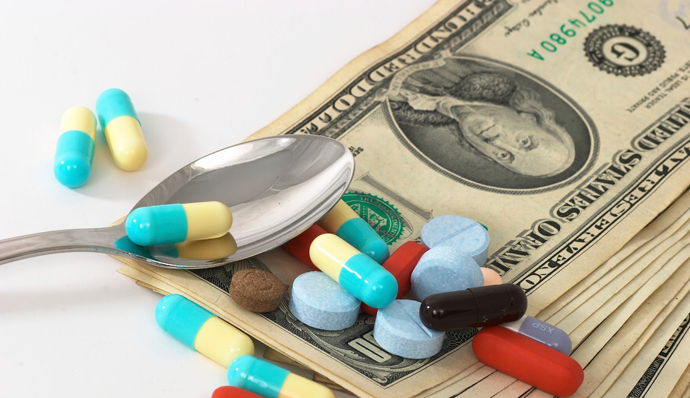Rania Imam – Eiman Rashed – Mahmoud Hammad
Medicine manufacturing companies call for a price hike after Egyptian pound flotation
A number of plants factories discontinued purchase of raw materials in anticipation for US Dollar stability
A breakthrough will be soon achieved in imported medicines with no locally manufactured alternatives after President El-Sisi has instructed the Ministry of Health to coordinate with a national company to import medicines that are not available at hospitals and pharmacies and have no local manufacturing alternatives. A breakthrough is expected as well, in the raw material crisis within the next few days after the state’s approval for subsidising medicines.
Ahmed El-Ezabi, Head of the Pharmaceutical Industry Chamber, said, “ President Abdel Fattah El-Sisi agreed that the state would subsidise vital medicines after the Central Bank of Egypt’s decision to float the Egyptian pound”. He added that the Egyptian market faces a medicines shortage due to the disappearance of a number of medicines from shelves. The chamber strived to resolve the crisis and held a meeting with the ministry of Health and relevant bodies discussing solutions for this crisis, the relevant government bodies informed the chamber during the meeting that the state will subsidise vital and essential medicines.
According to the Pharmaceutical Industry Chamber, 1500 medicines have disappeared from shelves since the beginning of this year, and the medicine shortages will further increase over the upcoming period. The chamber estimated that the medicines local manufacturing costs is expected to increase by 50% following the Egyptian pound devaluation.
Ali Ouf, Head of the Medicine Division at the Federation of Chambers of Commerce, said, “156 different types of medicines with no locally manufactured alternatives are imported, adding that President Abdel Fattah El-Sisi has responded to the calls of physicians and pharmacists and has instructed the Central Bank of Egypt to import all these medicines at the subsidised prices”. He called upon physicians to prescribe more than one alternative for unavailable medicines in order to reassure the patients that they will have the same effects. He asserted, “The meetings held among the cabinet, the Central Administration of Pharmaceutical Affairs and the parliament did not lead to raising medicine prices; however, the crisis is expected to intensify after depletion of the current strategic stocks of the State”. Ouf noted, “Before the decision to liberalise the exchange rate, the Egyptian Drug Authority used to subsidise the US dollar used in purchasing medicines, as the US dollar selling price was EGP.8 back then. However, it is now difficult for the importers to purchase the raw materials in US dollar at the new rate without raising prices”.
Dr. Ahmed Emad Eldin, the Minister of Health, has intervened to help resolve the crisis and held a meeting recently with the pharmaceutical manufacturers yet they failed to reach a solution. The minister requested not to raise the medicine prices until the US dollar exchange rate is stable while the pharmaceutical manufacturers insisted on raising the prices during these days to avoid losses; otherwise, they would discontinue production. The minister asserted that the crisis of medicine price hikes is fabricated, stating that the local pharmaceutical manufacturers are the main reasons for the shortage in medicines under the pretext that these are the implications of the exchange rate liberalisation.
He added that as many as 10,000 types of medicines are most commonly used and the Holding Company for Pharmaceuticals produces about 1,000 types of these medicines, global pharmaceutical manufacturers produce only 1000 types while the Egyptian domestic pharmaceutical manufactures produce 8 thousands types. The minister stated that complaints about medicine price hikes were only filed by domestic pharmaceutical manufacturers, noting that the ministry received complaints from three pharmaceutical manufacturers out of a total of 200 plants and manufacturers operating in the industry.
For his part, Ayman Abu Al-Ola, the Under-Secretary of the Parliament’s Health Committee, called upon the government to meet the pharmaceutical manufacturers and to find practical solutions to solve the crisis. He suggested manufacturing alternatives for imported medicines and importing only medicines that have no locally manufactured alternative. He also emphasised that medicines shortage cannot be tolerated and any failure on the part of the government will not pass unpunished.
He called for establishing and accrediting new pharmaceutical manufacturers and opposing monopolist practices carried out by a number of pharmaceutical companies, who control the medicine prices. He also emphasised the need to use scientific names of medicines, using active principle rather than the name of the medicine, noting that this method has been adopted in a number of countries and it is quite successful.
Dr. Hossam Omran, Export Director at EPICO, said, “The instability of the US dollar exchange rate after the Egyptian pound flotation lead to many companies refraining from purchasing new raw materials, as well as, raw materials manufacturing companies refused to sell there products to plants”.
Omran added, “We have not been able to provide needed raw materials within our factory since the second day of the decision to float the Egyptian pound, as the suppliers refused to sell raw materials, anticipating the new prices following the rise in US dollar exchange rate compared to the previous US dollar’s official selling price at the banks, which was EGP 8.88”.
Omran emphasised the need to establish Egyptian companies to manufacture medicines raw materials in order not to be controlled by the “US dollar exchange rate” while importing, as for the machines used to manufacture medicines and raw materials, these will need to be imported, which is a major obstacle to attain the current phase. Omran hoped that the local market would not reach a severe shortage stage, as a number of pharmaceutical companies tend to reduce production of medicines that depend mainly on imported raw materials. He pointed out that the liberalisation of medicine prices cannot be approved because it will be “disastrous” and medicines pricing cannot be left to the mercy of private or any type of companies.


